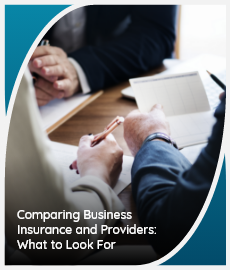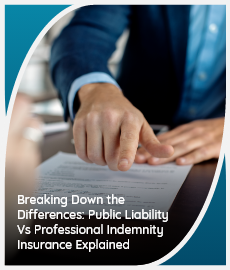Comparing Business Insurance and Providers: What to Look For
Posted on March 04, 2024 | by | Posted in Insurance


It goes without saying that in the modern world, all businesses require some insurance. Whether it is to protect themselves and their property should a natural disaster strike or ensure that any mistakes and accidents affecting outside parties are covered, the list is long and complex. So, where do you begin comparing business providers and the policies they offer? Here at Matrix Insurance, we have gathered a series of tips and strategies to employ and created a brief guide to help you through a process many people find daunting and stressful.
Opt for proven, reputable insurance companies
As tempting as it may be to lean towards smaller, more obscure insurance companies that offer lower premiums, they must first be recognised as financially stable and robust enough to provide protection. Many independent agencies exist that evaluate insurance companies and will grade them according to a range of factors. Seek out those grades and dismiss those that do not make the cut, switching your focus to reputable companies.
Insurance companies are not renowned for their flexibility or tendency to make exceptions but remember, they are keen to get your name on the dotted line. The insurance industry is filled to the brim with competing providers, and they may be prepared to strike a deal. This is where the assistance of professional insurance brokers like Matrix Insurance Group can be invaluable, as they will have an in-depth understanding of the market at any given moment and which buttons to push to secure the best deals.
Don’t assume all insurance quotes are created equally
The last thing you need if the time comes to claim on your insurance is a policy that only provides part of the coverage you require. We will look at the specific details to check for shortly but be aware that differences exist and can be fundamental to the efficacy and value of your chosen policy.
What kind of insurance does your business need?
Although many businesses fall into the same categories for convenience and ease of organisation, no two are ever truly the same. From premises style and location, staff numbers and stock levels, environmental issues, and more. Some common types of business insurance options for Australian business owners include:
- Cyber Liability—Protection against losses from a malicious data breach or other digital issues, from viruses to accidental emails and misplaced hardware.
- Business Insurance Pack—Coverage for accidental damage to your property, usually including your business premises and its contents, plus any stock therein.
- Commercial Property/Building—Similar to Business Pack Insurance, this insurance covers any loss or damage to the building, loss of rent due to said damage, and the property owner’s liabilities.
- Public Liability—Necessary for businesses of all types and sizes, this insurance provides cover if any member of the public is injured or has their property damaged due to your business activities. This includes them spending time at your location and any employees working outside the premises under your instruction. If a brick falls from a hod through a car window, you need public liability insurance to protect yourself.
- Professional Indemnity—This insurance protects against claims of alleged negligence or breaches of duty during the delivery of professional services of any kind.


Coverage and exclusions
When comparing business insurance quotes, carefully reviewing each policy line and benefit is essential. Luckily for consumers, Australian regulations mean that insurance companies must lay out their policy benefits and exclusions in a clear, straightforward way. Gone are the days when the fine print is used to hide unsavoury elements of any policy in the hope that it will not be noticed. If an insurance company offers confusing, unclear coverage descriptions or seems vague and unhelpful, dismiss it immediately. There are dozens more, and it is a competitive buyers market.
- Coverage—The maximum liability or risk the insurance company is prepared to pay for.
- Exclusions—Anything not covered by the insurance policy for any reason.
Compare policy financial limits and deductibles
When comparing your shortlist of business insurance providers, do not neglect any limits or deductibles they apply to a given policy.
Limits—represent the stated maximum amount the insurance company will pay in any given circumstance. If your business is more susceptible to external claims due to damage or injury, you should focus on policies with higher liability limits at the expense of property coverage and vice versa.
Deductibles— The amount you will be liable to pay yourself before the insurance company steps in to take the burden. Most are familiar with deductibles when renting a car or purchasing vehicle insurance. Higher deductibles usually mean lower premiums.
Additional considerations
Before you begin this process, carefully assess your reasons for purchasing business insurance and research your legal responsibilities. Certain types of businesses can only legally interact with clients if fully insured with the correct policy, so do your homework carefully and know where you stand regarding your responsibilities.
If you can avoid choosing your policy based on premiums alone, you open yourself up to a superior range of options and levels of coverage. Small businesses often operate on a fiercely tight budget, especially in the early days, and it is tempting to select the cheapest policy, but that can be a costly mistake.
Conclusion
Comparing as many business insurance quotes as possible is crucial to getting a good feel for the market, what to expect, and understanding how the process works more accurately. Give yourself ample time to complete the process satisfactorily and feel confident you have covered all the bases. If in doubt, speak to reputable insurance brokers like Matrix Insurance Group and let them take the weight off your shoulders and handle the job for you. Key factors to focus on include:
- Risks to your business
- Exclusions
- Coverage limitations
Contact us
If you wish to learn more about our role as one of Western Australia’s leading insurance brokers, please do not hesitate to contact us at your earliest convenience. With an experienced, knowledgeable team and unrivalled access to more than 120 competing insurers and underwriters, we can offer you incredible choice and flexibility, no matter your business model. We look forward to speaking with you in the near future and hopefully partnering with you moving forward.







